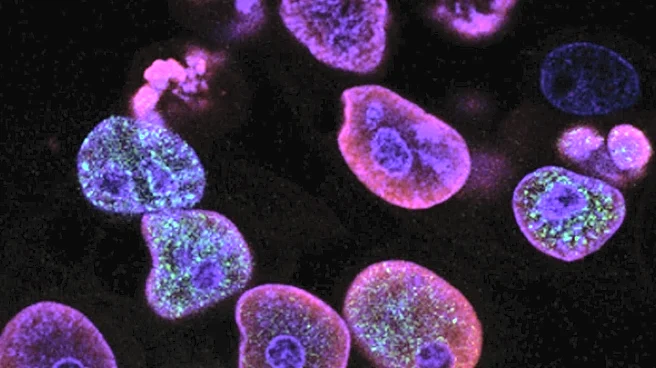What is the story about?
What's Happening?
Recent research has highlighted the significant role of Th17 cells in the pathogenesis of various autoimmune diseases, including psoriasis and inflammatory bowel disease (IBD). Th17 cells, a subset of T cells, are known for their involvement in inflammatory responses. The study reveals that these cells contribute to the development of psoriasis by interacting with IL-23-producing dendritic cells, leading to elevated levels of IL-17A, IL-22, and IL-23 in patients. Similarly, Th17 cells are implicated in the chronic inflammation characteristic of IBD, which includes Crohn's disease and ulcerative colitis. The findings suggest that Th17 cells, through their interaction with cytokines like IL-6 and IL-23, play a crucial role in the inflammatory processes that underlie these conditions.
Why It's Important?
Understanding the role of Th17 cells in autoimmune diseases is crucial for developing targeted therapies. These cells are central to the inflammatory processes that exacerbate conditions like psoriasis and IBD, which affect millions of people worldwide. By identifying the pathways through which Th17 cells contribute to disease, researchers can develop interventions that specifically target these cells, potentially reducing inflammation and improving patient outcomes. This research could lead to more effective treatments for autoimmune diseases, which are often difficult to manage and can significantly impact quality of life.
What's Next?
The study suggests further investigation into the signaling pathways and environmental factors that influence Th17 cell differentiation and pathogenicity. Future research may focus on developing drugs that can modulate these pathways, thereby reducing the inflammatory impact of Th17 cells. Additionally, understanding the role of gut microbiota and dietary factors in Th17 cell activity could open new avenues for therapeutic strategies, including dietary modifications and probiotics.
Beyond the Headlines
The implications of Th17 cell research extend beyond immediate therapeutic applications. This study highlights the complex interplay between immune cells and environmental factors, such as diet and microbiota, in autoimmune disease development. It underscores the importance of a holistic approach to understanding and treating these conditions, considering not only genetic and cellular factors but also lifestyle and environmental influences.
















